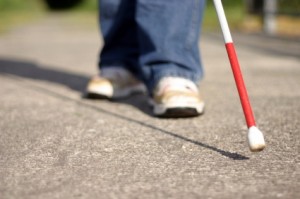 When disaster strikes, whether from a terrorist act, fire, tornadoes, or hurricanes, it is important to be prepared. What about those who are visually impaired? It certainly puts a whole new spin to preparation. There are many people without others to help them, who deal with their special needs every day. Disaster can be a step away, even without a major catastrophe.
When disaster strikes, whether from a terrorist act, fire, tornadoes, or hurricanes, it is important to be prepared. What about those who are visually impaired? It certainly puts a whole new spin to preparation. There are many people without others to help them, who deal with their special needs every day. Disaster can be a step away, even without a major catastrophe.
The visually impaired, even the very independent, should be especially cautious about their survival plan. The greatest concern will be disorientation in unfamiliar surroundings or situations. Guide dogs will not be much help because of their own fear that will surface as chaos ensues.
The visually impaired should find out what disasters could happen in their area. Next, they should make their own disaster plan and put it into action. The most important step of all is practicing and maintaining that plan. If at all possible, a plan should be put into place for a familiar person to come and help them to safety.
The Red Cross advises the visually impaired to prepare based on their capabilities and limitations after a disaster. Even a well-thought out plan might not go right. Chances are, the person will be alone until help is able to come. Having a plan will hopefully take the stress and worry away during the solitary time.
Answer these questions:
- What hazards exist in your area?
- What warning signals are used?
- Are there any provisions for the blind to assist them, such as Braille or audiotapes?
- If shelters are available, will they allow guide dogs? What shelters are available for your pets during a disaster?
It is also important to know all disaster plans at places where you work and play. The following list will help you get started on the things you will need in a disaster. However, each person and situation is unique, so brainstorm and come up with ideas that apply to you.
- Purchase an ABC-type fire extinguisher and learn how to use it.
- Install smoke detectors throughout your living space.
- Mark all preparedness supplies with Braille labels.
- Keep extra white canes, a talking clock with extra batteries, and an extra pair of sunglasses.
- Write down your medical and medication needs to keep with you at all times.
In addition to all of the above, have a survival kit ready. It should contain:
- Three gallons of water per person
- Canned food and opener
- Prescription and non-prescription medications, first aid kit, personal supplies, extra clothes, and bedding.
- Also include food for your service animal
It’s hard for a visually impaired person to live in a visual world. Every day is filled with challenges and triumphs. If well-prepared, a confident visually impaired person will most likely be better off than others not used to physical challenges. If and when disaster strikes, everyone is in trouble and thrown out of their routine. The prepared person, visually impaired or not, just might be a beacon in the night to others who find themselves in serious trouble.
 Off The Grid News Better Ideas For Off The Grid Living
Off The Grid News Better Ideas For Off The Grid Living



